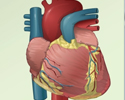Nephrotic syndrome
Nephrosis
Nephrotic syndrome is a group of symptoms that include protein in the urine, low blood protein levels in the blood, high cholesterol levels, high triglyceride levels, increased blood clot risk, and swelling.
Causes
Nephrotic syndrome is caused by different disorders that damage the kidneys. This damage leads to the release of too much protein in the urine.
The most common cause in children is minimal change disease. Membranous glomerulonephritis is the most common cause in adults. In both diseases, the glomeruli in the kidneys are damaged. Glomeruli are the structures that help filter wastes and fluids.
This condition can also occur from:
- Cancer
- Diseases such as diabetes, systemic lupus erythematosus, multiple myeloma, and amyloidosis
- Genetic disorders
- Immune disorders
- Infections (such as strep throat, hepatitis, or mononucleosis)
- Use of certain drugs
It can occur with kidney disorders such as:
- Focal and segmental glomerulosclerosis
- Glomerulonephritis
- Mesangiocapillary glomerulonephritis
Nephrotic syndrome can affect all age groups. In children, it is most common between ages 2 and 6. This disorder occurs slightly more often in males than females.
Symptoms
Swelling (edema) is the most common symptom. It may occur:
- In the face and around the eyes (facial swelling)
- In the arms and legs, especially in the feet and ankles
- In the belly area (swollen abdomen)
Other symptoms include:
- Skin rash or sores
- Foamy appearance of the urine
- Poor appetite
- Weight gain (unintentional) from fluid retention
- Seizures
Exams and Tests
The health care provider will perform a physical exam. Laboratory tests will be done to see how well the kidneys are working. They include:
- Albumin blood test
- Blood chemistry tests, such as basic metabolic panel or comprehensive metabolic panel
- Blood urea nitrogen (BUN)
- Creatinine - blood test
- Creatinine clearance - urine test
- Urinalysis
Fats are often also present in the urine. Blood cholesterol and triglyceride levels may be high.
A kidney biopsy may be needed to find the cause of the disorder.
Tests to rule out various causes may include the following:
- Antinuclear antibody
- Cryoglobulins
- Complement levels
- Glucose tolerance test
- Hepatitis B and C antibodies
- HIV test
- Rheumatoid factor
- Serum protein electrophoresis (SPEP)
- Syphilis serology
- Urine protein electrophoresis (UPEP)
This disease may also change the results of the following tests:
- Vitamin D level
- Serum iron
- Urinary casts
Treatment
The goals of treatment are to relieve symptoms, prevent complications, and delay kidney damage. To control nephrotic syndrome, the disorder that is causing it must be treated. You may need treatment for life.
Treatments may include any of the following:
- Keeping blood pressure at or below 130/80 mm Hg to delay kidney damage. Angiotensin-converting enzyme (ACE) inhibitors or angiotensin receptor blockers (ARBs) are the medicines most often used. ACE inhibitors and ARBs may also help decrease the amount of protein lost in the urine.
- Corticosteroids and other drugs that suppress or quiet the immune system.
- Treating high cholesterol to reduce the risk for heart and blood vessel problems -- A low-fat, low-cholesterol diet is usually not enough for people with nephrotic syndrome. Medicines to reduce cholesterol and triglycerides (usually statins) may be needed.
- A low-sodium diet may help with swelling in the hands and legs. Water pills (diuretics) may also help with this problem.
- Low-protein diets may be helpful. Your provider may suggest a moderate-protein diet (1 gram of protein per kilogram of body weight per day).
- Taking vitamin D supplements if nephrotic syndrome is long-term and is not responding to treatment.
- Taking blood thinner drugs to treat or prevent blood clots.
Outlook (Prognosis)
Outcome varies. Some people recover from the condition. Others develop long-term kidney disease and need dialysis and eventually a kidney transplant.
Possible Complications
Health problems that may result from nephrotic syndrome include:
- Acute kidney failure
- Hardening of the arteries and related heart diseases
- Chronic kidney disease
- Fluid overload, heart failure, fluid buildup in lungs
- Infections, including pneumococcal pneumonia
- Malnutrition
- Renal vein thrombosis
When to Contact a Medical Professional
Contact your provider if:
- You or your child develops symptoms of nephrotic syndrome, including swelling in face, belly, or arms and legs, or skin sores
- You or your child are being treated for nephrotic syndrome, but symptoms don't improve
- New symptoms develop, including cough, decreased urine output, discomfort with urination, fever, severe headache
Go to the emergency room or call the local emergency number (such as 911) if you have seizures.
Prevention
Treating conditions that can cause nephrotic syndrome may help prevent the syndrome.
References
Erkan E. Nephrotic syndrome. In: Kliegman RM, St. Geme JW, Blum NJ, Shah SS, Tasker RC, Wilson KM, eds. Nelson Textbook of Pediatrics. 21st ed. Philadelphia, PA: Elsevier; 2020:chap 545.
Saha MK, Pendergraft WF, Jennette JC, Falk RJ. Primary glomerular disease. In: Yu ASL, Chertow GM, Luyckx VA, Marsden PA, Skorecki K, Taal MW, eds. Brenner and Rector's The Kidney. 11th ed. Philadelphia, PA: Elsevier; 2020:chap 31.
Review Date: 7/27/2021
Reviewed By: Walead Latif, MD, Nephrologist and Clinical Associate Professor, Rutgers Medical School, Newark, NJ. Review provided by VeriMed Healthcare Network. Also reviewed by David Zieve, MD, MHA, Medical Director, Brenda Conaway, Editorial Director, and the A.D.A.M. Editorial team.




































